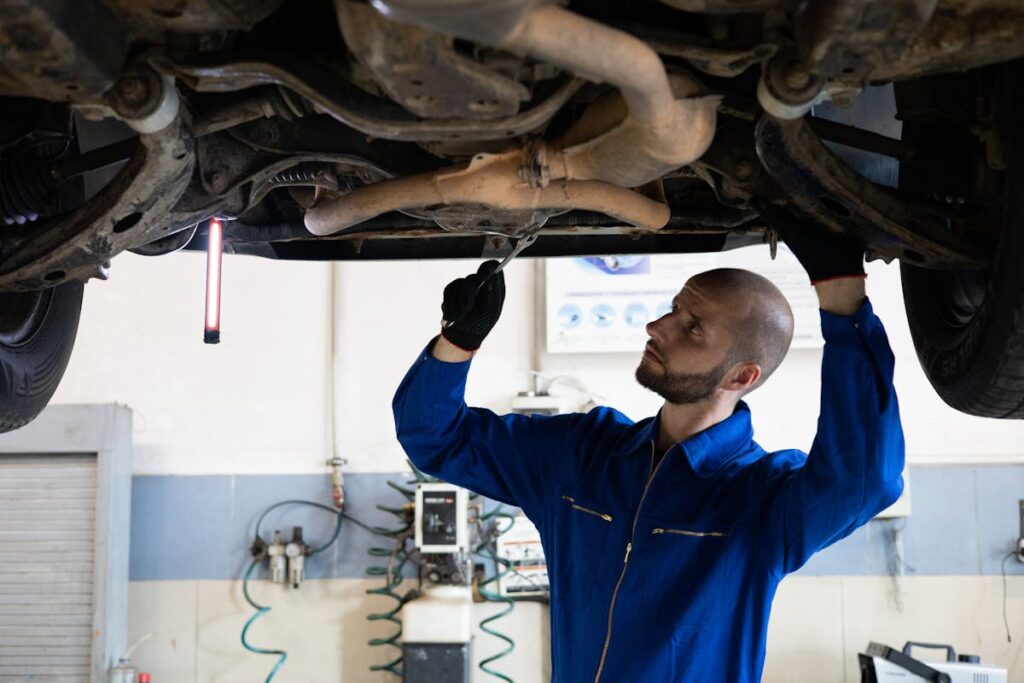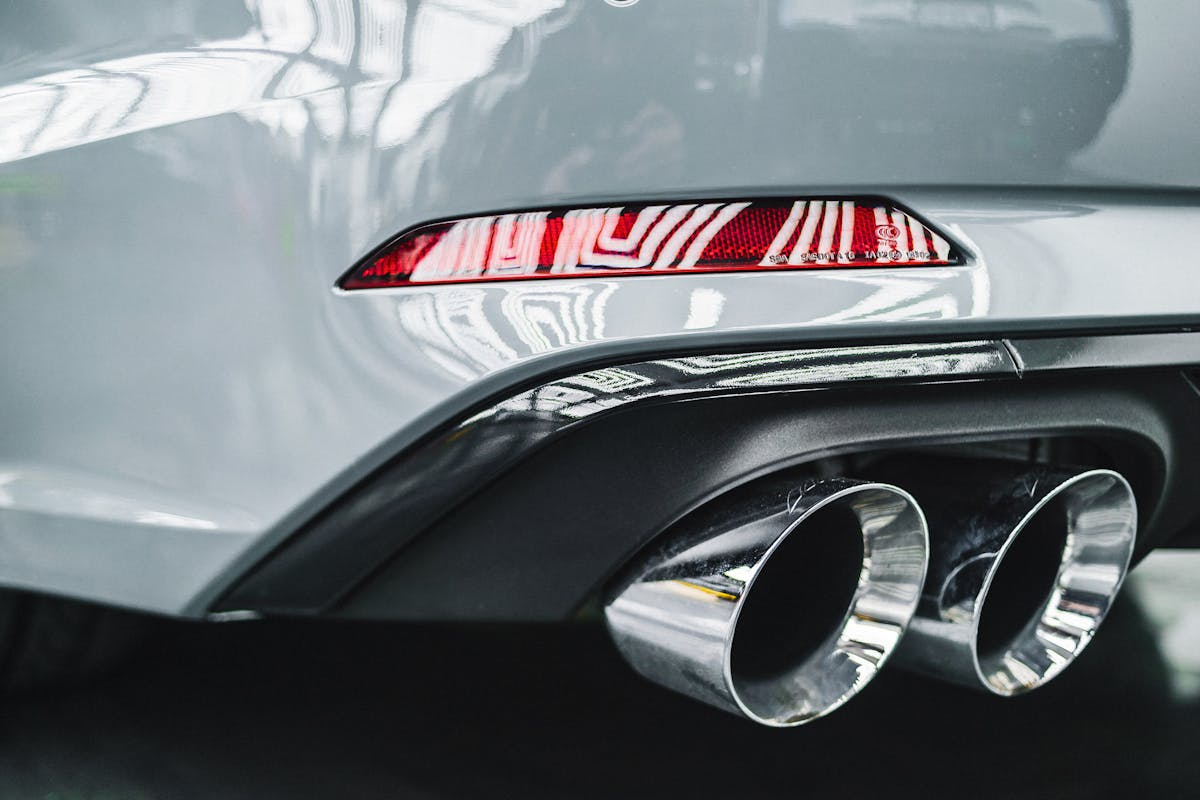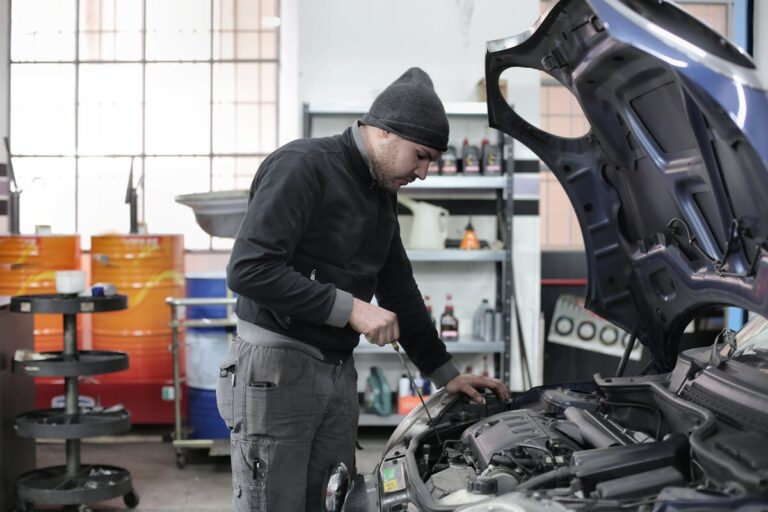Leaking Muffler
In the domain of automotive maintenance, the importance of a properly functioning muffler cannot be overstated. However, a common issue that often arises and warrants our immediate attention is a leaking muffler. This seemingly innocuous problem can trigger a chain of events, resulting in compromised vehicle performance, potential safety risks, and even legal implications. As we venture further into this discussion, we will uncover the signs of a leaking muffler, explore its causes, and navigate possible solutions, thereby emphasizing the significance of regular inspections and preemptive maintenance.
Understanding Muffler Functionality
The muffler, a vital component of your vehicle’s exhaust system, serves an essential dual purpose. First, it reduces noise produced by the engine’s exhaust gases by channeling them through a series of tubes and chambers designed to create opposing sound waves that cancel each other out. Next, it directs these gases safely out of your vehicle, thereby contributing to a cleaner environment.
Muffler design is integral to its functionality. Various designs exist, including chambered, turbo, and straight-through, each with its unique advantages. The chambered muffler design, for instance, utilizes a series of chambers of different sizes to alter the sound waves and reduce noise. Turbo mufflers, on the other hand, employ an s-shaped path to force the exhaust gases to travel further before exiting, thereby dampening sound more effectively.
A significant aspect of muffler functionality is exhaust flow. A well-designed muffler will promote smooth exhaust flow, reducing backpressure that can hamper engine performance. However, a balance must be struck between reducing noise and ensuring effective exhaust flow, as an overly restrictive muffler can also detrimentally affect vehicle performance.
Common Indicators of Muffler Leaks
There are several telltale signs that can indicate a leak in your vehicle’s muffler. Understanding these signs, their implications, and the steps to take for accurate diagnosis is critical to maintaining ideal vehicle performance. In the forthcoming discussion, we will explore these indicators, the potential impacts on vehicle operation, and provide essential tips for diagnosing muffler leaks.
Signs of Muffler Leaks
Identifying muffler leaks early on remains critical for vehicle performance and safety. Recognizing the signs of a compromised exhaust system can help in muffler maintenance and prevent more severe issues down the line.
One of the most telling indicators of a muffler leak is a noticeably louder exhaust noise. This can occur during vehicle acceleration or while the car is idle. Other signs include a distinct, pungent smell that often resembles rotten eggs. This is commonly due to the exhaust gases not being properly filtered out and instead leaking into the vehicle cabin.
Furthermore, condensation from the exhaust pipe, especially during periods of warmer weather, can also point to a potential muffler leak. This is often a result of a compromised exhaust system where the normal process of exhaust gases being converted and expelled is hindered.
Lastly, a decrease in fuel efficiency is another common indicator. If the vehicle is using more fuel than usual, it could be due to the engine working harder to compensate for the leak.
Implications of Leaking Mufflers
Recognizing the implications of a leaking muffler extends beyond mere inconvenience. The consequences can range from mild to severe, affecting both the vehicle’s performance and the health of its occupants.
From a mechanical standpoint, a failing exhaust system, characterized by muffler leaks, can result in decreased fuel efficiency. Unchecked, this can lead to an increase in fuel consumption, impacting both the vehicle’s performance and operating cost. Further, a compromised exhaust system may allow exhaust gases to infiltrate the vehicle’s interior, posing a potential health risk to the occupants.
The implications of a leaking muffler also extend to the environmental aspect. A malfunctioning exhaust system contributes to increased emissions, thereby exacerbating environmental pollution.
On the legal front, vehicles are required to meet certain emission standards. A leaking muffler could cause a vehicle to fail emission tests, resulting in hefty fines or inability to renew vehicle registration.
Lastly, the noise pollution caused by a leaking muffler can be a nuisance, leading to possible violations of local noise ordinances.
Muffler Leak Diagnosis Tips
How can you tell if your vehicle’s muffler is leaking? There are several key indicators to watch for in your ongoing muffler maintenance efforts, with changes in your vehicle’s normal operating sounds being one of the most noticeable.
When your muffler is functioning at its best, it should greatly reduce noise produced by your vehicle’s exhaust system. If you begin to hear loud, unusual sounds, especially during ignition or acceleration, this could be a sign of a leak. Another indicator is a noticeable decrease in your vehicle’s fuel efficiency. The exhaust system, including the muffler, plays a role in maintaining ideal fuel economy. A leak can disrupt this balance, causing your vehicle to consume more fuel than usual.
A visual inspection of the muffler can also reveal signs of a leak. Look for excessive rust, holes, or cracks on the muffler’s surface. Finally, the presence of condensation or soot at the exhaust pipe exit can also hint at a leaky muffler.
Potential Causes of Muffler Leaks
A multitude of factors can lead to the unfortunate occurrence of a leaking muffler. One of the most common culprits is rust damage, often a result of prolonged exposure to moisture within the exhaust system. This corrosion can weaken the structure of the muffler, eventually causing leaks.
Pipe connections within the exhaust system can also become loose or damaged over time, especially under rough driving conditions. Regular vehicle maintenance is essential to prevent these issues and to minimize repair costs. Changes in sound, such as increased noise or unusual vibrations, often indicate a problem with the muffler.
Heat exposure is another significant factor in the integrity of the muffler. The design of the muffler, which involves constant exposure to high temperatures, can cause materials to degrade over time, leading to possible leaks. This is particularly true with gasket failure, where the seal between different parts of the exhaust system breaks down.
Impact on Vehicle Performance
In the domain of automobile performance, a leaking muffler can introduce a myriad of problematic issues that extend beyond mere noise disturbance. Significantly, the impact on fuel efficiency and exhaust performance can be considerable, leading to less-than-ideal vehicle operation.
A leaking muffler compromises the exhaust system’s ability to direct gases away from the engine, causing backpressure. This phenomenon reduces engine efficiency, as it has to work harder to expel exhaust gases, leading to increased fuel consumption. As a result, a fully functional muffler is essential for maximum fuel efficiency.
Moreover, the muffler’s leak can also negatively affect the exhaust performance. The exhaust system’s primary role is to safely expel harmful gases produced by the engine’s combustion process. A leakage in the muffler disrupts this process, causing the engine to run hotter due to an imbalance in the air-fuel mixture. Over time, this can lead to a decline in overall engine performance, including reduced horsepower and acceleration.

Safety Risks Associated With Leaking Mufflers
Undeniably, leaking mufflers pose ample safety risks that should not be overlooked. From an environmental perspective, a malfunctioning muffler increases vehicle emissions, contributing to air pollution and exacerbating global warming. Excessive exhaust fumes, rich in harmful gases such as carbon monoxide, pose significant health hazards to both the vehicle’s occupants and people nearby.
Noise pollution is another issue linked to leaking mufflers. The constant drone and occasional backfires can lead to auditory problems over time, not to mention the disturbances it causes in residential and wildlife areas. Additionally, a compromised muffler can be a fire risk, especially if leaking exhaust fumes come into contact with flammable substances.
In addition to these risks, there are legal implications associated with driving a vehicle with a leaking muffler. Many jurisdictions enforce strict regulations on vehicle emissions and noise pollution; non-compliance can result in hefty fines or even vehicle impoundment.
DIY Muffler Leak Detection
In the domain of DIY automotive maintenance, detecting a leaking muffler can save you from potential safety risks and unnecessary costs. Recognizing the signs of a muffler leak, such as unusual noise levels, decreasing fuel efficiency, or visible rust and corrosion, is the first critical step. Once these signs are identified, a systematic inspection following specific steps can lead to accurate leak detection and further repair.
Recognizing Muffler Leak Signs
With an understanding of the function and importance of a vehicle’s muffler, it becomes essential to recognize signs that indicate a possible leak. By closely monitoring the performance and physical condition of your vehicle’s exhaust system, you can enhance muffler maintenance procedures and potentially prevent significant damage.
One of the first tell-tale signs of a leaking muffler is a noticeable increase in engine noise. A healthy muffler effectively reduces the noise produced by the exhaust system. Consequently, any sudden loud or rumbling sounds should alert you to a potential muffler leak.
Increased fuel consumption is another key indicator of a possible muffler leak. A malfunctioning exhaust system can negatively affect the vehicle’s fuel efficiency, leading to an increase in gas consumption. So, if you find yourself frequently at the gas station, a leaky muffler might be to blame.
Moreover, you might detect an unusual smell. A properly functioning muffler guides exhaust gases out and away from the vehicle. If there’s a leak, these fumes could enter the cabin, producing a peculiar odor.
Steps for Leak Inspection
A thorough self-inspection of your vehicle’s muffler can be an effective way to identify a potential leak. This step is critical to maintaining the overall efficiency and safety of your vehicle’s exhaust system.
The first step in an extensive muffler inspection is a visual examination. Look for signs of corrosion or damage on the exterior of the muffler. Any noticeable holes or cracks are indicative of a leak. It’s also important to pay attention to the connection points of the muffler to the rest of the exhaust system. These areas are susceptible to wear and tear and are common sources of leaks.
Next, listen for unusual noises when your vehicle is running. A functioning muffler should operate quietly. If you notice a loud or irregular noise, this could be an indication of a leak.
Lastly, feel for any abnormal vibrations in the steering wheel or pedal. These sensations may suggest a leak in your muffler or elsewhere in the exhaust system.
Professional Muffler Repair Options
While you may contemplate a do-it-yourself approach for minor muffler issues, entrusting your vehicle to a professional often proves more efficient and reliable, especially when dealing with considerable damage.
Professional muffler repair services focus on identifying the root cause of the problem, eliminating guesswork and potential misdiagnosis. These experts employ advanced diagnostic tools and techniques to precisely locate the issue within the exhaust system. Whether it’s a simple leak or a more complex issue, professional services can provide the most accurate diagnosis and treatment.
Muffler replacement is a common solution for severe damage. Professionals can guarantee a perfect fit for your specific vehicle model, maintaining the integrity of the entire exhaust system. Modern mufflers are designed to reduce engine noise and control the emission of harmful gases. A correctly installed replacement muffler can greatly improve your vehicle’s performance.
In instances where the damage is localized, a professional may opt for welding or patching techniques. These repairs are intricate and require a high level of expertise to guarantee the muffler’s durability and performance are not compromised.
Opting for professional muffler repair services can save you both time and potential future repair costs, guaranteeing that your vehicle’s exhaust system operates smoothly and efficiently.
Tips for Preventing Muffler Leaks
Proactively maintaining your vehicle’s exhaust system is key in avoiding the inconvenience and costs associated with muffler leaks. Engaging in regular muffler maintenance will not only increase the longevity of your exhaust system but also lead to better fuel efficiency and overall vehicle performance.
At the heart of preventive measures is the regular inspection of your exhaust system. This involves checking for rust, cracks, or holes that may presage a leak. It’s essential to pay attention to your tailpipe, as corrosion often starts from there, due to the moisture that condenses and remains in the pipe when the vehicle is not in use.
Another vital aspect of muffler maintenance is ensuring the exhaust hangers are in good condition. These are rubber mounts that suspend the exhaust system underneath your vehicle. When they wear out, the exhaust system can sag, leading to potential damage and leaks.
Frequently Asked Questions
How Much Does a Typical Muffler Replacement Cost?
The cost of a typical muffler replacement varies depending on muffler types and repair options. Prices generally range from $75 to $750, with labor costs included. Specific vehicle models and aftermarket options may affect the final price.
Are There Any Environmental Concerns Related to Leaking Mufflers?
Yes, there are significant environmental concerns. Leaks can potentially increase emissions impact, contributing to air pollution. Additionally, they can lead to noise pollution, disrupting local ecosystems and human environments with increased engine sounds.
Whats the Lifespan of an Average Car Muffler?
The lifespan of a car muffler varies depending on factors like muffler materials and vehicle maintenance. On average, a well-maintained muffler, typically made from stainless or aluminized steel, can last about five to seven years.
Does Car Insurance Typically Cover Muffler Repairs?
Typically, car insurance policies do not cover muffler repairs as these are considered routine maintenance. However, if the muffler is damaged due to an accident, the repair may be covered under collision or extensive coverage.
Can a Leaking Muffler Affect Fuel Efficiency?
Yes, a compromised muffler can indeed affect fuel efficiency. Muffler symptoms such as leaks can lead to increased fuel consumption as the vehicle’s exhaust system is not operating at its optimum efficiency.






